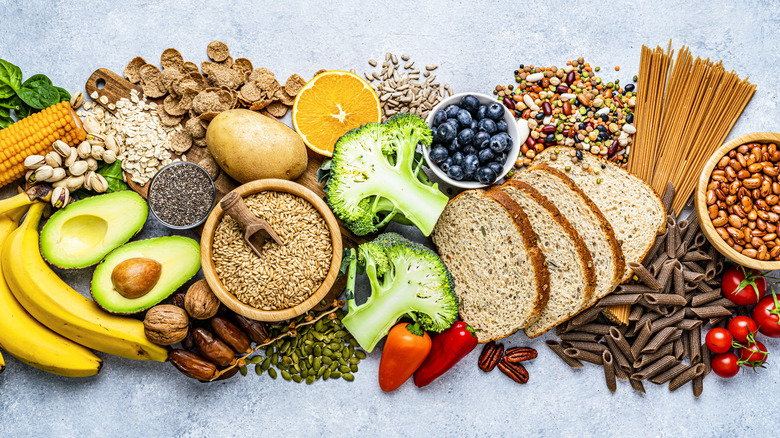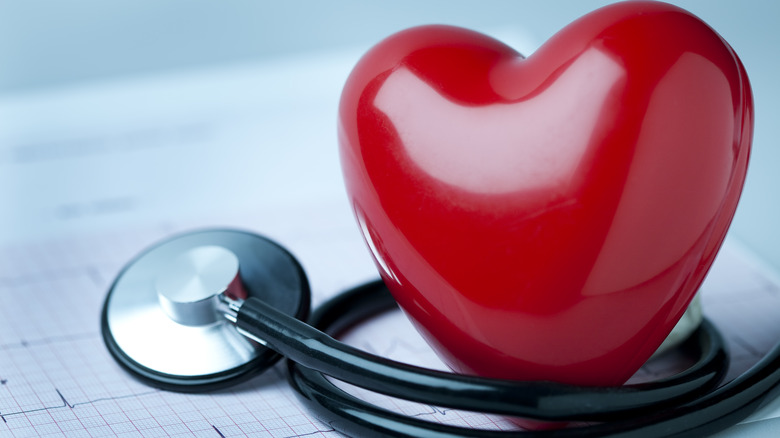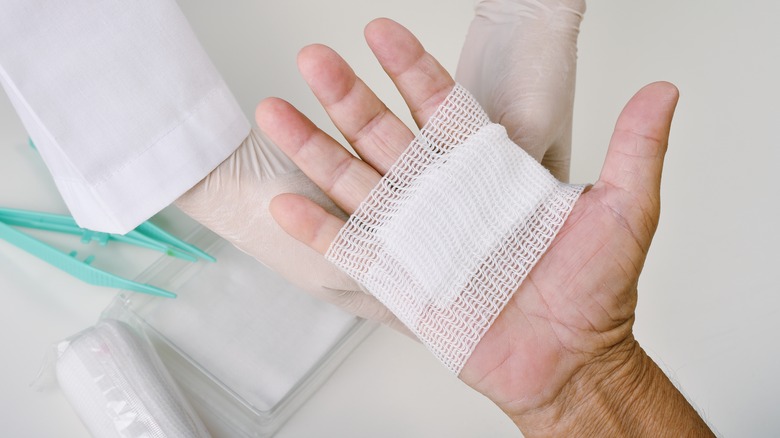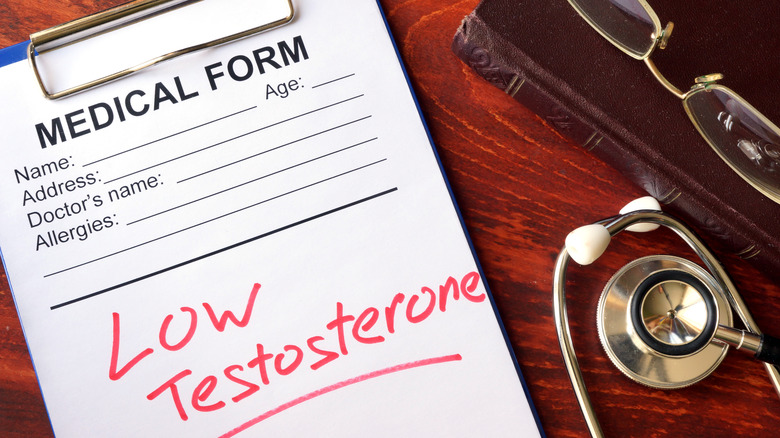When You Eat A Low-Fat Diet, This Is What Happens To Your Body
A low-fat diet is one of the many diet trends that attempt to reduce the risk of heart disease. Its early days date back to the 1970s, when the U.S. Senate first realized the association between dietary choices and heart attacks (via NPR). With this realization, America's food industry took a sharp left from eating fat-rich foods to a virtually zero-fat approach, opening the stage to a wide array of low-fat fad diets like the Ornish, Pritikin, and Optavia Diets (per U.S. News), and by the 80s and 90s, supermarket isles were full of low-fat or fat-free products.
According to the National Library of Medicine (NLM), a low-fat diet is an approach in which no more than 30% of your daily calorie intake comes from fat, with the main goal being the reduction of blood cholesterol levels in an effort to prevent atherosclerosis (the buildup of plaque in your veins). Atherosclerosis is one of the risk factors for heart disease, which happens to be the leading cause of death in the United States, via the National Center for Health Statistics. However, not all fats are created equal. Thus, the low-fat diet focuses on reducing the intake of unhealthy ones, like saturated fats and cholesterol, while still consuming monounsaturated and polyunsaturated fats, the healthier ones found in avocados, nuts, and seeds that actually promote heart health (per the NLM). While the effectiveness of low-fat diets has been heavily debated, they still remain a popular choice. Here's what may happen to your body when you eat a low-fat diet.
You might lose weight
One reason low-fat diets became massively popular by the end of the 20th century was their weight loss potential, and research seems to back this claim up. According to a review published in The BMJ, diets with a lower total fat intake were linked to small yet significant and sustained weight loss in adults. They also led to a reduction in body mass index and waist circumference, an indicator of unhealthy fat storage (visceral or belly fat) that, besides increasing the likelihood of heart disease, is linked with a higher risk of developing type 2 diabetes and metabolic syndrome (via Health Direct).
Similarly, another review published in The Cochrane Database of Systematic Reviews determined that eating fewer calories from fats may lead to a three-pound (1.5 kg) weight reduction over time compared to a regular-fat diet. One of the reasons reducing your fat intake may help you lose weight is because of the caloric load of fats. Fat is a calorie-dense nutrient that provides nine calories per gram, as opposed to the four calories provided by one gram of protein and carbs. Therefore, by limiting your fat intake, you're creating a calorie deficit that ultimately leads to weight loss (via Healthline). Moreover, since low-fat diets often compensate for their fat reduction by increasing the intake of fiber-rich foods, you may also experience increased feelings of fullness that help curb your appetite, further promoting the diet's weight loss effects (per Healthline).
Your fiber intake might increase
Starting a low-fat diet means removing a few items from your menu (think deli meats, processed snacks, pastries, fast foods, butter, and full-fat dairy). While these foods are known for being on the less-than-healthy side of the spectrum, they promote feelings of fullness because of the effects of fat on appetite hormones, gastric emptying, and intestinal transit, or the rate at which your stomach empties its contents and the speed at which food moves through your bowels (via the NLM). Removing said foods means you're making room for other options, and to compensate for the potential increase in appetite, you are more likely to add more fruits and veggies to your diet, leading to a higher fiber intake.
Fruits, vegetables, grains, and pulses have a couple of things in common: they're all naturally low in fat and rich in dietary fiber, a nutrient linked to countless health benefits, including reducing the risk of type 2 diabetes, heart disease, and some cancers, promoting gut health and regular bowel movements, reducing inflammation, and facilitating weight loss (via Medical News Today). Plus, like fats, fiber can help manage your appetite. According to a study published in Nutrition Reviews, this is because high-fiber foods have a similar effect on gastric emptying and intestinal transit, promoting feelings of fullness. Thus, whether you make this dietary shift consciously or not, swapping high-fiber foods for high-fat ones will help you enjoy a more nutritious diet while still keeping your appetite under control.
It might reduce your risk of heart disease
Reducing the risk of heart disease was the reason why the low-fat diet was created back in the 70s. However, current research seems to be divided about this. On the one hand, according to a study published in the Cochrane Database of Systematic Reviews, swapping unhealthy fats (such as trans fats and saturated fats) for healthier ones and high-fiber foods, as the low-fat diet suggests, might lead to a 17% risk reduction. Similarly, a review published in Healthcare found that replacing saturated fats with higher intakes of healthy fats like mono- and polyunsaturated fatty acids (MUFAs and PUFAs) can help reduce total blood cholesterol levels, LDL and HDL cholesterol, triglycerides, and blood pressure, improving multiple risk factors for heart disease at the same time. In addition, the review also found a risk reduction when the intake of high-fiber foods like whole grains was increased.
On the other hand, research also suggests that saturated fat intake is not associated with a higher risk of heart disease, as previously believed. For instance, a 10-year-long study published in Nutrition and Metabolism determined that there was no association between unhealthy fat intake and an increased risk of heart disease and even urged a reconsideration of the dietary recommendations for fat intake that have been around for decades. Still, if you'd like to add more healthy fats to your diet, try including olive and canola oils, fatty fish, such as tuna, trout, salmon, and mackerel, avocado, and nuts like peanuts, cashews, almonds, and pecans in your meals and snacks (via Harvard Health Publishing).
It might improve the outcome of certain types of cancer
When it comes to eating habits and cancer, following a low-fat diet might prove beneficial for people dealing with a couple of specific types of cancer. For example, some types of tumors, namely those with IDH1 gene mutations, rely on fats to grow. Thus, by following a low-fat diet, you'd be cutting off the tumors' food supply, potentially hindering their ability to grow and spread to other parts of your body (via Medical Xpress). According to the site, IDH1 gene mutations are common in some brain, blood, bone, and bile duct cancers.
Moreover, the American Association for Cancer Research (AACR) suggests that following a low-fat diet for at least five years might also benefit people with certain types of breast cancer. Per the AACR, reducing the diet's fat intake might not only improve long-term breast cancer survival but also reduce the risk of recurrence by 24%. According to a review published in Cureus, while the link between high-fat diets and breast cancer is still not completely understood, one potential mechanism explaining why excess fats facilitate tumor growth includes that they might promote a surplus of reactive oxygen species, a group of pro-inflammatory molecules that may overwhelm the body's defenses and trigger an autoimmune response, potentially leading to cancer development. Regardless of the why, following a low-fat diet might be a practical approach to creating a less favorable environment for cancer growth.
It may cause unfavorable metabolic changes
One of the most common opposing arguments against low-fat diets is the availability of a plethora of highly processed, low-fat products that have been created since the eating pattern reached industrial levels, seeing that, in order to maintain the palatability of the modified products, manufacturers are known to replace fats with other ingredients that are high in calories but low in essential nutrients, such as flour, sugar, and other refined carbs (via WebMD). Thus, while marketed as a healthier alternative due to their lower fat content, these calorie-dense yet nutrient-poor food products can be very misleading and may even lead to unfavorable metabolic changes.
According to the NLM, the risk of metabolic disorders such as diabetes, insulin resistance, and hypertriglyceridemia (high blood triglyceride levels) happens when low-fat diets promote the exchange of fat for the wrong kind of carbs, leading to higher intakes of refined carbs instead of those with a high fiber content. This shift may not only blunt the protective effects of HDL (good) cholesterol on your heart health but also reduce your overall HDL levels while raising your blood triglyceride levels, thus leaving you following a version of the low-fat diet that defeats its original purpose. To prevent this unfavorable outcome, be sure to make the appropriate food swaps by relying on minimally processed products and prioritizing healthy fats and carbs.
You might miss out on important nutrients
People are very quick to point their fingers at fat as the culprit of conditions like obesity or heart disease, urging others to limit intake to virtually negligible amounts without considering that fats play numerous vital roles in the body, one of them being the absorption of fat-soluble vitamins. As their name implies, fat-soluble vitamins, which include vitamins A, D, K, and E, are a group of vitamins that are not only predominantly present in fat-containing foods but also require fat to act as a carrier for their absorption. This means that by significantly cutting down your fat intake, you risk not absorbing these nutrients, potentially leading to vitamin deficiencies (via Healthline).
Vitamin A is involved in immune function and eye and skin health. Thus, its deficiency is associated with blindness, hair and skin problems, and a higher risk of infections. Vitamin D is also essential for immune function and bone health, and its deficiency may increase the risk of infections and bone fractures. However, fatigue, depression, and impaired wound healing are also reported. Regarding vitamin K, this one is essential for blood clotting and bone health. Thus, its deficiency may cause excessive bleeding and an increased risk of bone fractures. Lastly, vitamin E acts as an important antioxidant in the body, protecting your cells from free radical damage, and though rare, its deficiency may cause weakness, tremors, impaired vision, and poor immune function. To avoid vitamin deficiencies when following a low-fat diet, be sure to add healthy fat sources to your meals.
You might experience slow wound healing or hair loss
Besides acting as a source of fuel, fats are also essential to wound healing and hair growth, which is why limiting your fat intake by following a strict low-fat diet might lead to slow wound healing or hair loss. According to a review published in Eplasty, once fat gets broken down into fatty acids, it plays a key role in healing both acute and chronic wounds. Per the review, the first reason behind this effect is that fatty acids provide the energy the wound needs to heal. In contrast, another reason suggests that fat molecules are required for tissue growth and wound remodeling, the last phase of the wound healing process in which scar tissue begins to form (per the NLM).
As for the role of fats in hair growth, a study published in Dermatology Practical and Conceptual explains that some fatty acids promote hair growth by enhancing the number of hair follicles. In addition, the study states that fat-soluble vitamins D and A are also involved in the hair growth process. For starters, animal evidence shows that vitamin D seems to be involved in hair follicle cycling, while vitamin A might activate hair follicle stem cells to make hair grow. However, the study explains that while vitamin D and fatty acid deficiencies may lead to scalp and eyebrow hair loss, the same actually happens when dealing with excessive vitamin A levels.
It may reduce testosterone levels in men
While women also produce smaller amounts of it, testosterone is a reproductive hormone predominantly present in men needed for sexual development and drive, sperm production, and keeping healthy bones and muscle mass (via Healthline). Per the site, despite reductions in testosterone levels being an expected part of the aging process, some circumstances may accelerate the loss, including stress, obesity, some medications, and a number of health conditions. However, current evidence suggests that certain dietary patterns, such as a low-fat diet, may also play a role in modulating testosterone levels in men.
According to a study published in The Journal of Urology, men who followed a low-fat diet had small but significantly lower blood testosterone levels than men who followed a nonrestrictive diet. Per Medical News Today, symptoms of low testosterone in men may include adverse effects on sexual health, such as erectile dysfunction, lower sex drive, reduced semen production, and a reduction in testicle size. In contrast, non-sexual symptoms include an increased risk of brittle bones, mood changes, hot flashes, hair loss, fatigue, increased body fat, memory impairment, and an increased risk of developing conditions like type 2 diabetes and even some cancers. Still, while the reduction in testosterone levels was a clear result, researchers are still unsure about why or how diet has this effect.
You might struggle with your mental health
While many seem fixated on the blood cholesterol-reducing effects of low-fat diets, few note that cholesterol is a key nutrient for brain functioning. Therefore, one potential side effect of following a low-fat diet might be the toll it might take on your mental health. According to a study published in the Journal of Psychiatric Research, your brain needs cholesterol for the transmission of nerve impulses and the production of mood-regulating hormones like serotonin. Research suggests that low cholesterol levels seem to reduce the brain's serotonin availability, an effect that has been linked with external mortality causes, such as deaths from suicide or homicide, since the 1990s.
Similarly, another study published in Psychiatry Research determined that low cholesterol levels might create a dysfunction in the process by which serotonin is transmitted within the central nervous system. Said alteration has been linked to increased impulsivity in people with mood, anxiety, and personality disorders, which might exacerbate the risk of suicide. Furthermore, according to Psychology Today, the effects of having very low cholesterol levels extend to an increased risk of developing depression or depressive symptoms. While there's no denying that keeping your cholesterol levels within healthy parameters is important for heart health, it is also necessary to understand that taking it to the extreme might have dire consequences for your mental health. Thus, be sure to find a balance between the two when following a low-fat diet.










